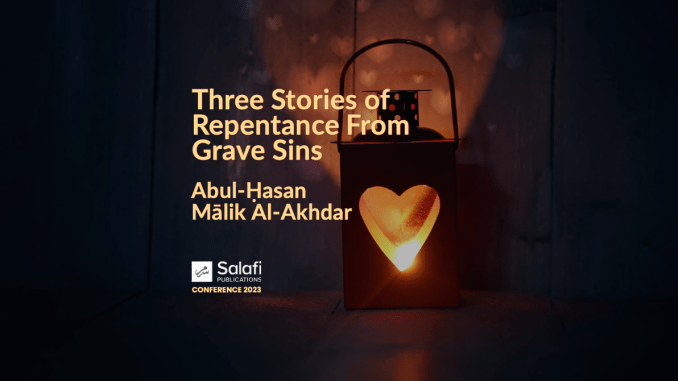
All praise is due to Allah, the Lord of all creation—and may He extol the Messenger in the highest company of Angels, and grant him peace and security—likewise to his family, Companions, and true followers.
[13/08/2023] [Part 3] Three Stories of Repentance From Grave Sins – By Abul-Ḥasan Mālik Al-Akhdar (حفظه الله) – SalafiPublications Summer Conference 1445 | 2023. Masjid Salafi, Small Heath, Birmingham, UK.
Some points covered by Abul-Ḥasan Mālik Al-Akhdar (حفظه الله):
- Shaykh Aḥmad an-Najmī’s (رحمه الله) refutation of those who tried to say music is permissible.
- The seeker of truth vs the seeker of falsehood regarding accepting evidence.
- A ḥadīth regarding a people from this ummah who will consider illegal sexual intercourse, wearing silk (for men), consuming intoxicants and musical instruments to be lawful, and how they will be punished.
- The way of the people of desires in playing with the chains of narration in order to support their desires.
- How the wording of the ḥadīth proves that the four affairs mentioned are impermissible.
- Shaykh Mubārakfūrī (رحمه الله) on the meaning of al-Mazā’if.
- The importance of referring to the books of language.
- The great virtue of the scholars of Ḥadīth from India.
- Shaykh Aḥmad an-Najmī (رحمه الله) on what falls under the banner of musical instruments.
- Clarification that Allāh is free from oppression and will only punish for something that is ḥarām.
- A question for those who claim that music and musical instruments are not ḥarām.
- The great wara’ of the Companions (رضى الله عنهم).
- Shaykh Ibn Bāz (رحمه الله) on the Salaf’s severe repudiation of those who played musical instruments.
- The evil results of busying oneself with music.
- Research regarding the effect of music on people’s mood.
- How music affects the culture of the people.
- A verse from the Qur’ān that is evidence for the prohibition of music and musical instruments.
- Shaykh ‘Ubayd’s (رحمه الله) advice on being mindful regarding weak narrations and attributing to the Salaf that which they are free from.
- The story of the tawbah of Zādhān al-Kindī (رحمه الله) at the hands of ‘Abdullāh b. Mas’ụd (رضى الله عنه).
- Refutation of those who say they are utilising their “gift” when warned against engaging in music (and other impermissible affairs).
- The importance of advising and reminding the people.
Questions:
- What is your advice regarding a person who wronged another person and wants to repent to Allāh but is fearful that if he informs the person that he harmed him behind his back it may cause a greater fitnah?
- Is concealing sins only for the major sins or does it also include the minor sins?
- I would like to memorise asanīd, narrators and their biographies but I find my memory is weak. How do I improve my memory and precision?
- Are you allowed to expose your sins from the past to teach someone a lesson that these things are not good for you?
- In a sit down, are women allowed to ask a man if he hits his wife or anything to do with sins in general?
- Can you please clarify the ḥadīth of the Abyssinians playing the duff on Eid?
- Question regarding encouraging sisters to accept polygyny.
Polite Request: We have made these audios freely available ― We request that you donate the amount of just £2 or $2 (or more) as a Sadaqah to the Salafi Bookstore and Islamic Centre so they can continue their work to print and distribute free audios, leaflets and booklets to aid the da’wah of Ahlus-Sunnah and Hadīth across the world. And please make du’ā to Allah that He continues to aid and strengthen this blessed da’wah.
Please leave a comment below after listening to this audio, and make sure to share. May Allah bless you.


Be the first to comment